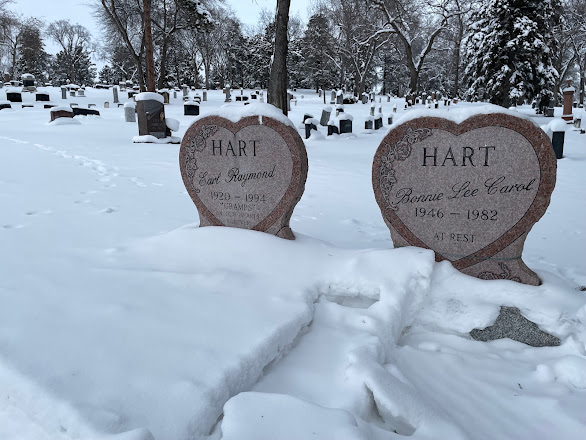Three Things from Edmonton podcast, episode 52: cemeteries, trains, infrastructure
This is where, despite it all, or because of it all, I try to notice three things from my ordinary life that made me happy or grateful, and unpack them, so I keep an idea of the kind of stuff I am carrying around with me. Here is Three Things, episode 52.
1. Cemeteries
On New Year’s Day, I go for a walk in a cemetery. I’ve done it for years now. This year it was the St. Anthony/Mount Pleasant graveyards on 106th Street. I like the feeling of being in a graveyard, the feeling of knowing that I am in a graveyard and, especially, the feeling of walking out of a graveyard. I go to graveyards so I can still leave. My number isn’t up yet. In a graveyard, I’m nobody’s number. I mean, there are no neon or flashing signs or eye-catching vide there. I’m not being sold anything. No logos or brands. Just granite and upper case fonts, a lot of Times New Roman, if I’m not mistaken. It’s dramatic to be in the Mount Pleasant cemetery, standing on the hill, to the left a slope of snow-covered tombstones, to the right a slope of snow-covered bungalows, the two kinds of dwelling places separated by a thin lane of asphalt along which snow-covered cars move.
I go to the graveyards to read. A graveyard is a library, of course. Open to the public, organized in sections, with indexes. The effect of being in a giant book is enhanced in winter by the paper-white snow on which the rows of headstones sit like print on a page.
It’s a quiet place to scan titles: David Lloyd “Smitty” Smith. Or to get some copyright page information: Luella Belle Kirkland 1913-1955. There are dedications and quotations and there are illustrations, like the piano on the tombstone of Laura Eleanor Irene Lobb, who died at 86 years of age on March 23, 1998.
Words matter in graveyards. The words said at the interment, the words whispered by mourners who come back to commune, the words chiselled into the headstones, and, as happened to me on this January 1st stroll as I walked past an idling vehicle at Mount Pleasant, its driver’s side window rolling down as I approached, the words “Happy New Year” spoken aloud to me by the woman behind the wheel. So, I go to graveyards for the words—to read them, to hear them, to embody them as I track along the page. Reading has always made me feel in motion, and quite alive.
I can still hear the sound of the model train coming through the red shed and into the turn that took it behind the built-to-scale gingerbread hotel and back through the toy tunnel in the real lobby of the real Hotel Macdonald. It’s impossible not to stop and watch a model train in motion. Yes, the two Old Fashioneds in me after Auntie Shelagh and I toasted the New Year in the Confederation Lounge made me a bit wistful, but I would have stopped and marvelled just the same. Besides the engine, the little train had a boxcar, a dump car and a caboose. It was a short sentence of a train hauling its freighted words down the line. It had a tanker car, too, I noticed, to convey explosive thoughts, perhaps.
My Achilles heel is in my neck. My C6 vertebra doesn’t always play nice, and this past week it has derailed some of my joy. A bit of agony, to be honest. But with the teamwork of Auntie Shelagh, Bob my physiotherapist, Steeve my physician, relief may be coming into some relief. Common sense is kicking in, too. I'm not going to take any more expired T3s gifted to me by a former work colleague. I shouldn't be self-prescribing, even though I do have two Arts degrees.
Being in pain does help me see some things. In The Human Condition, Hannah Arendt reminds us that the experience of living without pain is not ever as keen as the relief felt when pain subsides. And that while living pain-free is what the body strives for, there might be other goods even greater for human beings to contemplate, which might be what Dylan means when he sings:
Freedom just around the corner for you/
But with truth so far off, what good would it do?
Of course, this makes perfect sense at 3:26 am while I am walking through the darkened house trying in vain to dampen the electrical storm in my back and down my right arm as I listen down the street to where the dogs are barking. By 3:27 am, I will again settle for just freedom from pain.
Thank you to all who work to relieve pain.










Comments
Post a Comment